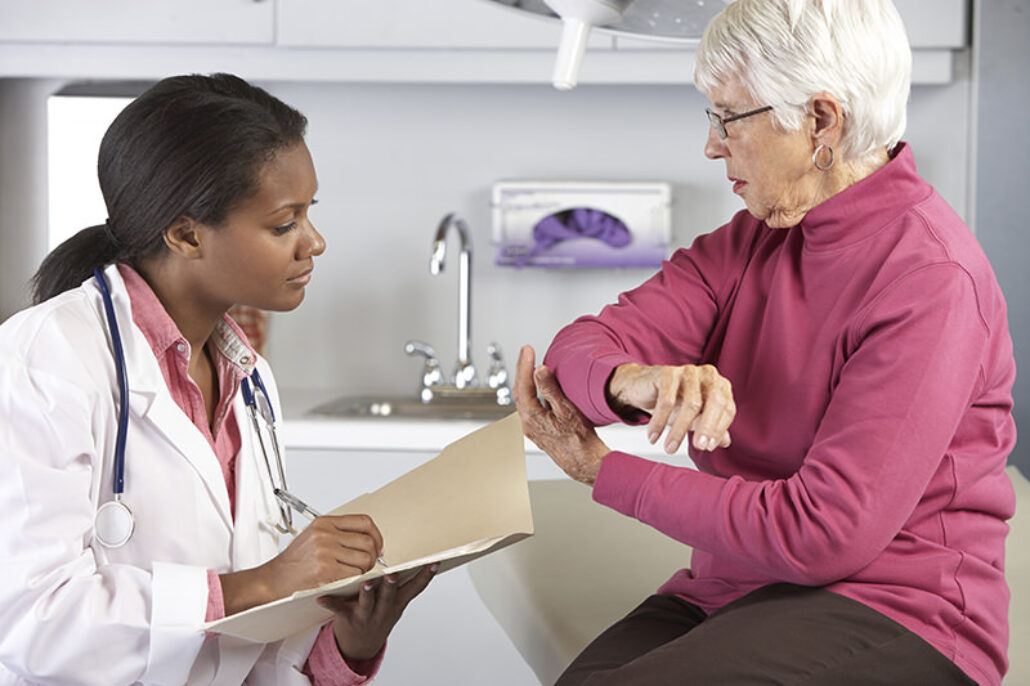The risks of rheumatoid arthritis can include reduced fertility for women and coronary artery disease, as well as permanent joint damage. We review the symptoms that should alert you to consult with your physician.
Although there is no cure for rheumatoid arthritis, early diagnosis is important. Left unchecked, inflamed cells in the diseased joint release enzymes that digest bone and cartilage, frequently causing the joint’s shape and alignment to deteriorate with consequent pain and loss of movement.
The severity of disease symptoms varies from patient to patient, and can change from day to day. For 50 percent of women, the development of rheumatoid arthritis is a gradual process: symptoms develop slowly, and may wax and wane over time. Others may experience sudden increases in symptoms, called flares, which can last for days or months. If a joint on one side of the body is affected, the same joint on the other side of the body is usually affected too.
If you notice symptoms associated with rheumatoid arthritis, and these symptoms persist for a number of weeks, it is important to consult your physician. The symptoms of rheumatoid arthritis may include any of the following:
- Swelling and stiffness. General aches in your joints, especially when you wake up in the morning, is an early symptom of this disease. Unlike osteoarthritis, which affects joints subject to wear and tear over time, rheumatoid arthritis can affect joints on both sides of the body.
- Warmth and redness. This disease causes chronic inflammation of the joint linings, so it is not unusual to experience signs of inflammation around affected joints. Other symptoms include weakness, achy sore muscles, and fatigue.
- Firm lumps just under the skin. Approximately 20 percent of women with rheumatoid arthritis develop rheumatoid nodules, raised lumps under the skin. These nodules often occur on the elbows, or other areas where there is repeated pressure on the skin. They can also occur in the eyes, heart, or lungs.
- Pleurisy. About half of affected women develop inflammation in the lining of their lungs, making it difficult and painful to breathe deeply.
- Pericarditis. Rheumatoid arthritis related inflammation can also develop around the sac housing the heart. Be alert to symptoms including chest pain, a dry cough, and fever.
- Vasculitis. Rheumatoid arthritis sometimes inflames the blood vessels themselves. One sign of vasculitis is the appearance of tiny broken blood vessels in the nail bed.
Early treatment can maximize benefits and slow joint deterioration. If you notice symptoms that suggest rheumatoid arthritis, consult your physician for an evaluation.
When to seek treatment for your arthritis
Arthritis doesn’t have to spell the end of an active life. If you are experiencing worrisome symptoms or persistent pain, the renowned arthritis specialists at Summit Orthopedics can help. We work with you to confirm a diagnosis and develop an appropriate conservative treatment plan. If nonsurgical treatments fail to support your lifestyle goals, fellowship-trained orthopedic surgeons will consult with you and discuss appropriate surgical options. Summit is home to innovative joint replacement options. Our Vadnais Heights Surgery Center is one of only two surgery centers nationally to receive The Joint Commission’s Advanced Certification for Total Hip and Total Knee Replacement.
Start your journey to healthier joints. Find your arthritis expert, request an appointment online, or call us at (651) 968–5201 to schedule a consultation.
Summit has convenient locations across the Minneapolis-St. Paul metro area, serving Minnesota and western Wisconsin. We have state-of-the-art centers for comprehensive orthopedic care in Eagan, MN, Plymouth, MN, Vadnais Heights, MN, and Woodbury, MN, as well as additional community clinics throughout the metro and southern Minnesota.
More resources for you
- Diagnosis and Treatment Of Rheumatoid Arthritis
- Women And Rheumatoid Arthritis: Know Your Risk Factors
